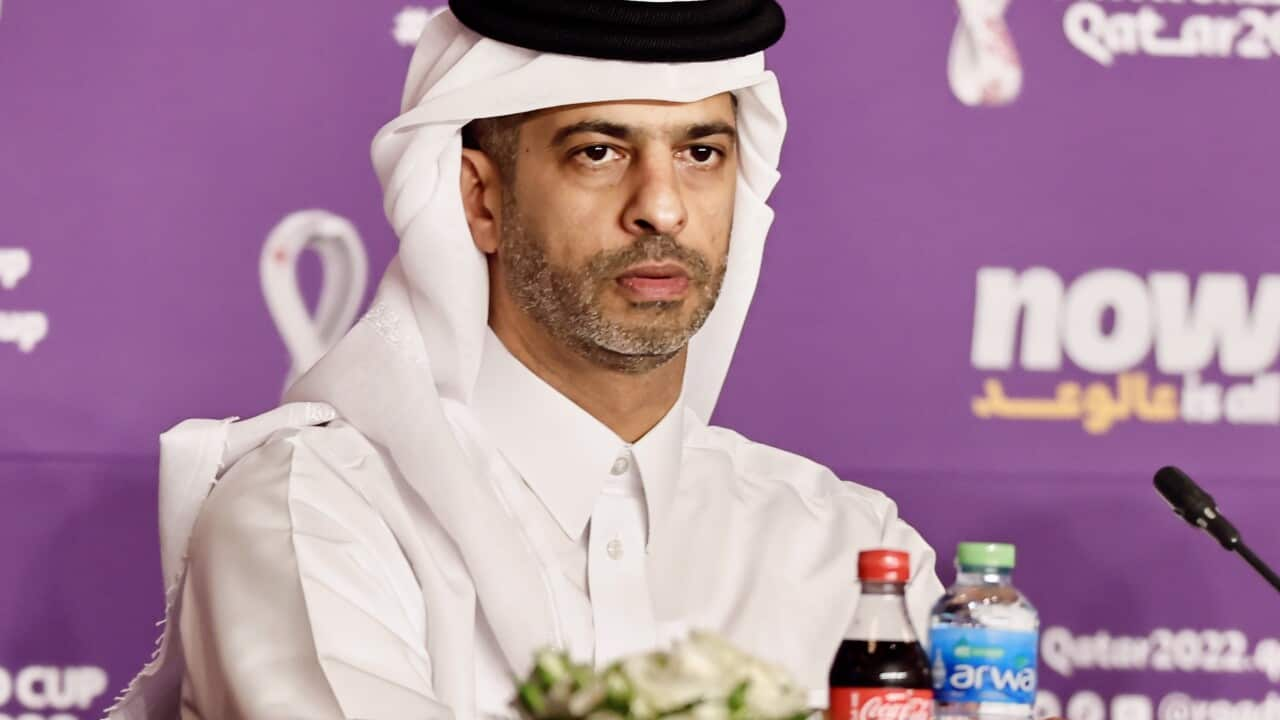Key Points
- Qatar has been accused of violating the human rights of migrant workers.
- FIFA has defended Qatar and called Western critics hypocritical.
- Rights groups are calling for more thorough investigations into migrant worker deaths.
Anish left his poverty-stricken family in Nepal to help build Qatar's Lusail Stadium, with the hope of providing for his loved ones.
He was promised timely wages, decent accommodation, free food, and was told the company we would work for was "nice".
But the reality Anish experienced was the opposite.
"You have to do something when you cannot provide enough food to eat, we have to go overseas," he said.
"I could not tell my parents the reality of what was really going on. They’d worry about their son. And if I told them the full story, they would get sad.
"It’s okay if I am unhappy, but I can’t see my family sad."
Anish is owed thousands of dollars in unpaid wages and illegal fees, according to Equidem, a human rights and labour rights charity.
He says "food was supposed to be free" but was deducted from his wages - a form of called debt bondage.
The weather was so hot while Anish and other migrant workers built the state-of-the-art stadiums, he said "even if we drank 10 bottles of water, we did not feel the need to urinate".
He said if workers complained, they had their wages cut.
Equidem said HBK Contracting Company, Anish's former employer, did not respond to their request for comment.
Following international condemnation of Qatar for its treatment of migrant workers, and FIFA for awarding the prestigious tournament to the nation, leaders from both Qatar and FIFA claimed the country was striving to address its human rights record.
In a press conference on the eve of the World Cup in November, FIFA President Gianni Infantino denounced Western critics for what he claimed was hypocrisy and announced Qatar would open a workers' welfare unit.
He also said FIFA would provide a "legacy fund" following the tournament.
What are the issues around migrant workers in Qatar?
The true death toll of migrant workers building World Cup infrastructure in Qatar is disputed and difficult to verify due to limited information provided by the Qatar government.
However, a by Tord Kjellstrom, a New Zealand-based professor in climate change and global health, substantiates claims that migrant worker deaths were caused by extreme heat, and were preventable.
The study, conducted between 2009 and 2017, found a strong correlation between average monthly afternoon heat levels and cardiovascular disease mortality among the workers.
Globally, 15 per cent of deaths of people aged 25-35 were due to cardiovascular disease causes, but among Nepali migrants in Qatar the figures were 22 per cent in the cool season and 58 per cent during the hot season.

Source: SBS News
Other areas of reported exploitation include unpaid wages, large unexpected recruitment fees incurred by workers, and workers not having the right to leave their job.
The Socceroos were among those raising awareness of migrant worker conditions in Qatar.
"These migrant workers who have suffered are not just numbers. Like the migrants that have shaped our country and our football, they possessed the same courage and determination to build a better life," players from Australia's national team said in a video released prior to the tournament.
How have Qatar and FIFA responded?
Mr Infantino said the West should look at its own human rights records before criticising Qatar.
“I think for what we Europeans have been doing around the world for the last 3,000 years, we should be apologising for the next 3,000 years, before starting to give moral lessons,” he said.
“Today I feel Qatari. I feel Arab. I feel African. I feel gay. I feel disabled. I feel a migrant worker.”
Those comments by the Swiss millionaire were labelled by Human Rights Watch as "absurd" and by South African football journalist Melissa Reddy as "disrespectful".
But the FIFA boss asserted to reporters that his organisation, along with Qatar, was making progress towards improving its human rights record.
FIFA has promised to set aside funding for establishing a labour excellence hub in partnership with the International Labour Organisation (ILO) to share best practices in "labour matters" and support adherence to the United Nations Guiding Principles on Business and Human Rights when hosting FIFA tournaments.
SBS understands that the ILO will establish a permanent office in Doha, and in this office, there will be a workers' representation unit.
Mr Infantino said there are still "some remaining formalities" before the office can be established.
The Building and Wood Workers’ International (BWI) union has been calling on Qatar to establish a migrant workers’ centre for over a decade, and said it is crucial for the country's legacy.
“That is a legacy for Qatar and the world that will live in beyond the end of the World Cup tournament. However, to date, there is no sign that sustainable change is forthcoming,” the union said.
Migrant workers remain unable to form or join trade unions in Qatar.
What will the legacy of Qatar’s World Cup be for migrant workers' rights in the region?
Qatar's Supreme Committee for Delivery and Legacy said its World Cup has "contributed to a legacy of progress, better practice, and improving lives - and it’s a legacy that will live long after the final ball is kicked.’’
In 2020, Qatar was praised for its reform to the Kafala system, a system of governance for migrant workers in Gulf countries that binds them to their employer.
The reforms allowed migrant workers to change jobs without employer permission and set a higher minimum wage for all workers, regardless of nationality - making Qatar the first Arab Gulf nation to allow this.
According to the ILO, more than 350,000 applications to change jobs have been approved in the two years following the introduction of new legislation, "with positive outcomes for Qatar’s economy as a whole".
But some rights groups argue to deliver a positive legacy from the tournament, the Qatari government must properly investigate the deaths of the migrant workers.
After the recent death of a Filipino migrant worker, Alex, who died while working on repairing a stadium during the group stage, Qatar's World Cup boss became upset at journalists for inquiring about the incident.
"Death is a natural part of life, whether it's at work, whether it's in your sleep," Nasser Al Khater, chief executive of the 2022 World Cup in Doha, said.
"We're in the middle of a World Cup. And we have a successful World Cup. And this is something you want to talk about right now?"
Human Rights Watch said too many migrant worker deaths have been dismissed as due to "natural causes" or "cardiac rest" and aren't properly investigated.
In a statement, the group has called for compensation for Alex's family.
"Qatar and FIFA have doubtlessly learned by now that the world is watching more than just the games, and seeing officials’ blatant disregard for the migrant workers who built the infrastructure that made this World Cup possible," the group said.
"Instead of trying to deflect the criticism, Qatar and FIFA should right these wrongs by compensating migrant workers and their families."
The Qatari government said it is investigating Alex's death.












